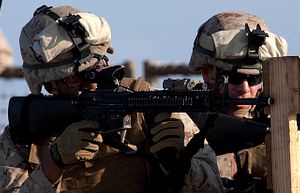I’ve received quite a lot of feedback on my post yesterday, “What Do Chinese and Russians Think of the U.S. Military?” Some made the point that my argument seemed shallow and belabored the obvious (“Chinese and Russians see the U.S. military as a threat” – Oh, really? ). In fact, I was trying to make a deeper point, one that deals with perceptions and misperceptions of the United States Armed Forces abroad.
One of the issues I have with discussions about the U.S. military within the United States is that Americans often miss the wood for the trees. As George Orwell said: “To see what it is in front of one’s nose needs constant struggle.” For the outside world, the United States military by its sheer size and might alone constitutes a threat – notwithstanding the “Americans Will Always Fight For Freedom” perception within some segments of U.S. society – and so inevitably it will have a tough time posing as a “global force for good” (a phased out recruiting slogan by the U.S. Navy), even though it unequivocally is for the global order.
Consider this simple realization in the context of a few of the more daring foreign policy decisions of the United States of late, such as the invasion of Iraq. If someone sees you as a threat, it is hard to pose as a liberator in the long run, no matter what you do (another rather simple assertion!).
What I am driving at here is that a flawed understanding of how the United States and the U.S. military is seen abroad may contribute to another foreign policy blunder in the near-term future. In an age of austerity it is no longer possible to abide by General Walter Bedell Smith’s dictum: “The American Army does not solve its problems, it overwhelms them.” Americans need to be more perceptive of the outside world, lest they end up with, “premature cognitive closure, in which limited or incomplete images of others’ intentions lead to mistaken perceptions,” in the words of Robert Jervis in his book Perceptions and Misperceptions in International Politics. As Jervis points out, this is a prescription for bad policy. For anyone doubting the power of perceptions in foreign policy, I highly recommend Jervis’ work.
Jervis also touched on self-perception in the essay “What’s Wrong With the Intelligence Process?” back in 1986: “Indeed, intelligence is often expected to predict how a state will react to alternative American policies, and this can only be done if one understands the images of the U.S. that the other holds.” The importance of this is supported by Sun Tzu in his classic The Art of War, who prioritizes knowing one’s own side first: “If you know the enemy and know yourself, you need not fear the result of a hundred battles.”
Truly knowing yourself is especially difficult for the U.S. military, since it would require a birds-eye perspective, hard to obtain for someone who is part of the whole machinery (as commander-in-chief of the United States Armed Forces only Abraham Lincoln was able to do this during the U.S. Civil War). As Stephen Peter Rosen notes in “Competitive Strategies – Theoretical Foundations, Limits and Extensions”: “Although it is hard to understand others, it is harder to understand ourselves. The field of psychology has convincingly documented the unreliability of individual self-assessments with regard to personal attributes and competence.”
He continues: “A major effort in the area of American self-assessment at the level of the nation but also broken down by relevant organization and functional subcomponents of organizations, would be of great value (…)” It helps to eliminate “blind spots” as Rosen points out. Yet, genuinely knowing yourself is impossible without knowing what others think of you. To come back to James Fallow’s article “The Tragedy of the American Military” one last time. The piece is commendable, yet rather than focusing the debate on the trees it may on occasion be worth glancing at the woods, and from time to time to also peek across the oceans to understand how others might be viewing the American military colossus from afar.

































